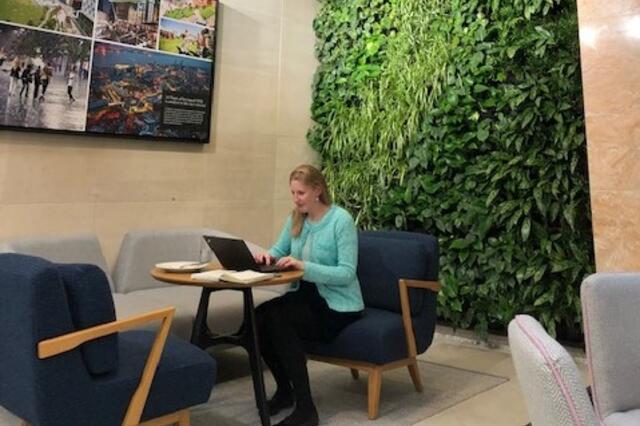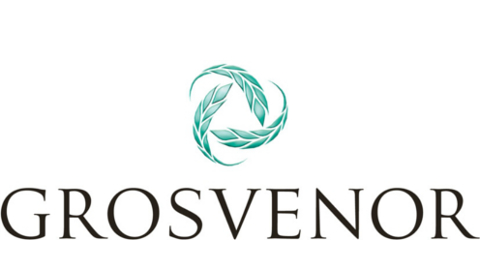Grosvenor Tests Wellbeing and Efficiency Plans Through its London Office
05 April 2019Grosvenor Tests Wellbeing and Efficiency Plans Through its London Office
05 April 2019Grosvenor Britain & Ireland has introduced a range of new technologies at its London office to test the potential for rollout across its London estate in the West End. They include biophilic design, green living walls, pollution-neutralising paint, ultra-low water-use toilets, a wellbeing room, a maternity room, smart lighting and a highly successful delivery consolidation programme.
Key Facts
- Better air quality, after the installation of living walls
- 19% less energy consumption in the London office, cutting costs and carbon emissions
- Fewer vehicle deliveries, reducing congestion and pollution
Situation
Grosvenor has long sought to have a responsible impact on the environment and this approach has guided and inspired its activities for over a decade. Grosvenor strives to create, manage and invest in sustainable places that deliver social, environmental and economic benefits for everyone.
Grosvenor Britain & Ireland is using its London office to test new technologies to trial environmental efficiency and wellbeing initiatives for the wider estate to take forward. 70 Grosvenor Street, Mayfair, is Grosvenor’s largest global office, home to around 450 employees. Completed in 1999, the building provides 4,650m2 of prime office space over six floors and a basement with bespoke parking facilities for cyclists.
Actions
Health and wellbeing
- Installing a 36m2 living wall that reaches from the ground floor restaurant up through the main reception, with an additional 80m2 of living wall applied to structural columns throughout the building to create a total of 116m2 of greened surface in the property. The impact of the living wall on air quality in the reception is being monitored through a Foobot sensor, which tracks particulate matter, temperature, chemical pollutants and humidity.
- Using Airlite paint in the refurbishment of meeting rooms. This VOC-free paint neutralises pollutants such as nitrogen oxide and nitrogen dioxide up to 88.8%, eliminates 99.9% of bacteria, inhibits mould and prevents odours. It attracts water molecules in the air to create an invisible, protective film that blocks dust and dirt from attaching.
- Transforming the restaurant to empower different ways of working and socialising, providing a combination of areas for dining, collaboration and quiet time, and the space can be converted for events. Catering partner CH&CO Group has introduced a nutritious menu, low in sugar and fat, with all key nutritional values clearly signposted.
- Introducing a wellbeing room, with greenery, colour adjustable lighting, books and music. This private room provides a tranquil space that anyone can use for reflection, prayer, reading or scheduled wellness activities, such as acupressure, massage and one-to-one welfare sessions. Following the success of this initiative, Grosvenor recently introduced a quiet room prioritised for new mothers and mums-to-be, providing a further space for quiet reflection, breastfeeding and other perinatal necessities.
- Installing four CoeLux circadian lights in each meeting room, thus creating a brighter, more natural environment for meetings.
Energy efficiency and wellbeing
- Replacing all 4,500 cathode ray and fluorescent tubes with LED lights that use 50% less energy per unit on average. New controls allow every individual light to be adjusted to meet specific user preferences. In addition, daylight sensors are used to automatically reduce artificial lighting when natural daylight is available. The new lights also produce more diffused, even coverage of light, without the use of traditional reflectors, making them less dazzling and thus less tiring for colleagues’ eyes.
- Upgrading rooftop chillers and converting fan coil units from AC to DC, so they use 50% less energy. Each fan coil unit is linked into the Building Management System (BMS), so that temperatures can be adjusted to suit the preferences of teams in different areas and, where heat spots are created through solar gain, air conditioning can be adjusted.
Reducing local congestion and pollution
- Partnering with Anglo Office Group and Gnewt Cargo to establish a delivery consolidation scheme, to bring all personal and business packages into the West End as a single delivery using an electric vehicle. Grosvenor, Anglo and Gnewt are now engaging with local partners and occupiers to roll the system out across the London estate.
Water saving
- Replacing all 34 WCs with Propelair toilets that use 80% less water per flush than traditional models. The new toilets use a combination of compressed air and water for flushing while also reducing germs.
Recycling
- Working with waste partner First Mile to simplify waste streams to three streams: mixed recycling (including paper, cardboard, cans, tins, glass, cartons, plastic bottles and carrier bags), non-recycling (mainly wood, rubber, textiles and polystyrene) and food waste.
- Working with catering partner CH&CO to reduce waste, including optimising portion size, introducing fully recyclable coffee cups and changing packaging to avoid single use plastic wherever possible.
Financials
- 18 months return on investment for WCs, through water cost savings.
- Three years forecast return on investment for lighting, through energy cost savings.
Benefits
Improvements versus the previous year:
- Improved indoor air quality for employee and visitor wellbeing. Foobot sensor data shows 100% optimum air quality readings after the living wall was introduced, versus around 75% beforehand.
- 19% reduction in electricity use. This supports Grosvenor Britain & Ireland’s aim to reduce energy use by 50% across its directly-managed London estate portfolio by 2023.
- Reduction in personal and business deliveries from an average of 22 per day to one, improving the environment for people living, working and visiting the area. The pilot alone consolidated 1,146 parcels into 65 deliveries, saving 3,667 miles, equivalent to 1.9 tonnes less CO2 over 3 months.
- 42% reduction in water use, saving eight million litres of water, enough to fill three Olympic swimming pools.
- 93% recycling, up from 79%, with zero waste to landfill.
Challenges and Achievements
DELIVERY CONSOLIDATION
How to secure occupier buy-in for the rollout?
Although the delivery consolidation programme has been successfully piloted, it is challenging to bring new occupiers on board. Members of Grosvenor’s Operations team are talking to occupiers in Mayfair and raising awareness. They think the potential for the consolidation programme to improve the local environment for their employees and visitors is enormous. Two-thirds of deliveries to London businesses are for personal use, so consolidating them can play an important role in reducing traffic congestion and pollution. Grosvenor is engaging with the New West End Company and Victoria Business Improvement District on opportunities to expand the delivery consolidation model beyond Grosvenor’s geographical boundaries, which is a positive sign of things to come.
WASTE
How to reduce contamination?
Grosvenor is engaging with employees to create a culture of responsible recycling. The new simpler process reduces the risk of contamination. It was explained via emails, intranet, printed notices on bins and at sustainability meetings. New bins were also introduced at key locations, with clear, pictorial labelling. Spot checks indicate that colleagues are increasingly understanding the problem of waste contamination and using the correct bins for their waste.
*Please note that the information on this page was supplied by the BBP Member and the BBP assumes no responsibility or liability for any errors or omissions in the content

